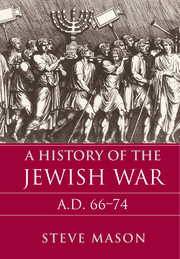Book contents
- Frontmatter
- Contents
- List of Illustrations
- List of Tables
- Acknowledgements
- Part I CONTEXTS
- Part II INVESTIGATIONS
- 4 WHY DID THEY DO IT?: ANTECEDENTS, CIRCUMSTANCES, AND “CAUSES” OF THE REVOLT
- 5 NERO'S WAR I: THE BLUNDER OF CESTIUS GALLUS?
- 6 NERO'S WAR II: FLAVIANS IN GALILEE
- 7 JERUSALEM I: JOSEPHUS AND THE EDUCATION OF TITUS
- 8 JERUSALEM II: COINS, COUNCILS, CONSTRUCTIONS
- 9 A TALE OF TWO ELEAZARS: MACHAERUS AND MASADA
- CONCLUSIONS
- Appendix
- Bibliography
- Bibliographical Abbreviations
- Index of Modern Authors
- Index to Historical Persons, Groups, and Places
- Index of Texts, Inscriptions, and Papyri
6 - NERO'S WAR II: FLAVIANS IN GALILEE
from Part II - INVESTIGATIONS
Published online by Cambridge University Press: 05 February 2016
- Frontmatter
- Contents
- List of Illustrations
- List of Tables
- Acknowledgements
- Part I CONTEXTS
- Part II INVESTIGATIONS
- 4 WHY DID THEY DO IT?: ANTECEDENTS, CIRCUMSTANCES, AND “CAUSES” OF THE REVOLT
- 5 NERO'S WAR I: THE BLUNDER OF CESTIUS GALLUS?
- 6 NERO'S WAR II: FLAVIANS IN GALILEE
- 7 JERUSALEM I: JOSEPHUS AND THE EDUCATION OF TITUS
- 8 JERUSALEM II: COINS, COUNCILS, CONSTRUCTIONS
- 9 A TALE OF TWO ELEAZARS: MACHAERUS AND MASADA
- CONCLUSIONS
- Appendix
- Bibliography
- Bibliographical Abbreviations
- Index of Modern Authors
- Index to Historical Persons, Groups, and Places
- Index of Texts, Inscriptions, and Papyri
Summary
Look, my father came into the region not to exact retribution from you for the Cestius affair, but to bring you to your senses. For you may be sure that if he had come for the removal of this nation, the appropriate thing would have been to race toward your root and immediately sack this city [Jerusalem]. Instead, he kept ravaging Galilee and the surrounding parts, granting you time for a change of heart. But to you, this example of humanity appeared as weakness, and you nourished your audacity on our gentleness.
Josephus’ Titus to John and Simon in Jerusalem (War 6.338–40)Josephus’ Titus explains why Vespasian did not pursue a strategy we associate with Carl von Clausewitz (1780–1831). The Prussian soldier-spy emphasized the need to concentrate forces on the enemy's “focal point of force and movement” (Schwerpunkt). Commanders must resist temptations to divide their forces for small contests, which never decide a war and are hazardous besides: “In a word, the first principle is: to act with as much concentration as possible. The second principle is: to act as swiftly as possible; therefore to permit no delay or detour without sufficient reason.” Josephus has Titus claim that because a concentrated assault on Jerusalem was the only sensible method of national punishment, Vespasian's decision to linger in the north proves that he was motivated by kindness (τὸ φιλάνθρωπον) and gentleness (ἡ πρᾳότης).
It is not necessarily so. Clausewitz had in view states with regular armies. With irregular resistance fighters who were indistinguishable from ordinary folk, the Romans had either to annihilate the population or to drain the morale of potential militants (Chapter 3). Because they chose the latter, their aim became the reestablishment of control and domination at minimal risk. With psychological considerations paramount in both cases, the main difference between Vespasian's campaign and that of Cestius was that Vespasian had the time to be much more deliberate. He had nothing else to do but to suppress whatever revolt had been expressed in the massacre of the auxiliary garrison and the ambush of Cestius.
As we saw in Chapter 3, Liddell Hart proposed that the indirect approach was actually the essence of strategy. It kept the enemy off balance and in constant fear while forcing them to disperse their defences.
- Type
- Chapter
- Information
- A History of the Jewish WarAD 66–74, pp. 335 - 401Publisher: Cambridge University PressPrint publication year: 2016



